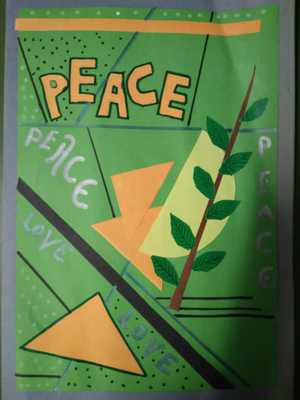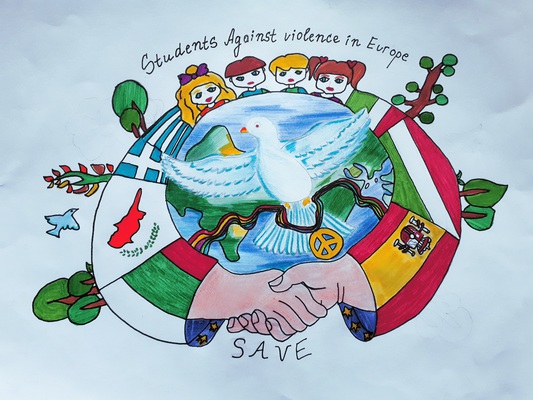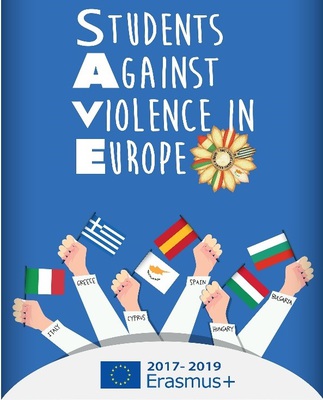 What peace is to me…
What peace is to me…
Peace booklet
Collection of interactive games and activities to raise
and promot the peace and the nonviolenve
1. INTRODUCTION
2. NONVIOLENCE
3. PEACE METHODES
4. ART, CREATIVITY
5. IDENTITY
6. EMPHATY
7. REFUGEES & MIGRATION
8. NGOs & INSTITUTIONS
9. SHORT FILMS

We live in an interdependent and globalised world and the world has become less peaceful. Collectively, we face a range of challenges: inequality, poverty, racial and religious intolerance, discrimination, violent extremism, migrant crisis and conflicts. The future will pose new issues that we cannot yet predict but we should prepare our future generations to face these challenges with the knowledge and skills provided by our global learning commitment. In order to bring about change we need to learn about the challenges we face, our interdependence and our power to positively effect change and contribute to the world.
One of the biggest problems in our society is violence, especially violence against children. It cuts across boundaries of geographies,race class, religion, culture. The Convention on the Rights of the Child forms an international basis for ensuring the rights and protection of children. Yet, in every country of the world, there are children who continue to fear and experience violence.
Education is a fundamental right to each and every child. Education is crucial for children’s development, enabling them to cultivate their creative talents and critical thinking, gain life skills, develop social relations, and grow with dignity, confidence and self-esteem as individuals. It has a unique potential to generate an environment where attitudes condoning violence can be changed and non-violent behavior can be learned. Schools can break patterns of violence and provide skills to communicate, to negotiate and support peaceful solutions to conflicts. Schools offer children the possibility of learning and internalizing values of solidarity, tolerance and respect, and they serve as important resources for the promotion of non-violence and for overcoming tension and mediating conflicts, among pupils and staff, and also beyond, in the wider community.
For many children, however, the school environment represents a very different universe, where they may be exposed to violence. They experience violence in many forms. Playground fighting, verbal abuse, intimidation, humiliation, corporal punishment, sexual abuse, gang violence, or other forms of cruel and humiliating treatment are some common expressions of this phenomenon. The negative impact of violence in schools goes beyond the children who are directly affected by it. It touches the lives of those who witness it, creating an atmosphere of anxiety and insecurity incompatible with learning. The project will be a contribution to raise awareness, to foster knowledge and prevent and address violence against children, to mobilize decisive action to accelerate progress in violent prevention and elimination, to build equal opportunities and respect diversity in our society, in our community, in our schools. We would like to promote peace and mutual understanding among young generations of different countries, strengthen intercultural awareness and dialogue between different ethnic, religious groups, migrants and refugees by using the international language of communication- music, dance, arts, literature, improve competences and limit conflicts at local, regional and international level. Fostering critical and creative thinking will allow students to develop knowledge, understanding, and skills to lead and sustain change in our society and effectively respond to new challenges. Students will learn to respect and value their own culture and that of others, that people have multiple roles and responsibilities in society and that people's contribution is valued regardless of race, religion, ability gender, or age. Learning to empathise with others, will help students to take responsibility to challenge prejudice and discrimination, where it is encountered.
Our goal is to develop learners ability to communicate globally with a highly diverse range of people, be global citizens, active citizens in a way of thinking and behaving, promote peace and care about the future of this world. We believe that we can make a difference!
Lorita Zaharieva, Bulgaria coordinator of the project

BLOG: http://studentsagainstviolence.blogspot.com/2017/12/erasmus-plus.html
FACEBOOK https://www.facebook.com/groups/153326095262684/
WEBSITE: https://erasmussave.wixsite.com/erasmus
TWINSPACE https://twinspace.etwinning.net/55250
The European Commission support for the production of this publication does not constitute an endorsement of the contents which reflects the views only of the authors, and the Commission cannot be held responsible for any use which may be made of the information contained therein.